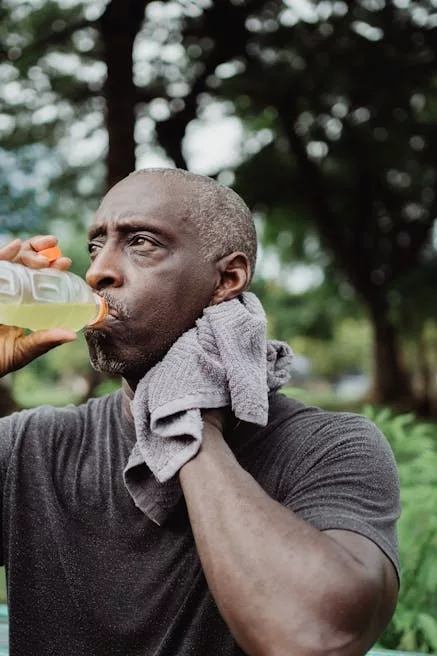
Electrolytes are critical for maintaining your body’s overall health and performance, especially during physically demanding activities like hiking. Whether you’re tackling steep trails or enjoying a day hike, understanding the role of electrolytes can help prevent dehydration, muscle cramps, and fatigue.
In this guide, the question “why are electrolytes Important for the body?” will be thoroughly explored. From what electrolytes are, why they’re essential, and how hikers can replenish them for peak performance.
What Are Electrolytes?
Electrolytes are minerals in your body that carry an electrical charge. They are essential for a variety of bodily functions, including maintaining fluid balance, muscle contractions, and nerve signaling.
Common electrolytes include:
- Sodium: Regulates fluid balance, blood pressure, and plays a key role in proper nerve signaling and muscle function.
- Potassium: Essential for maintaining normal muscle and heart function, supports cellular processes, and is critical for nerve transmission.
- Calcium: Vital for strong bones and teeth, muscle contraction, nerve function, and blood clotting.
- Magnesium: Supports energy production, regulates muscle and nerve function, maintains a steady heartbeat, helps control blood sugar and blood pressure, and contributes to bone health.
- Chloride: Works with sodium to maintain fluid balance, helps regulate blood volume and pressure, and supports the production of stomach acid for digestion.
- Phosphate: Works alongside calcium to strengthen bones and teeth, supports energy storage and utilization, and is involved in cell repair and growth.
- Bicarbonate: Maintains the body’s acid-base balance (pH), helping to neutralize excess acid in the blood.
These electrolytes work together to keep your body functioning properly, especially during strenuous activities like hiking.
Why Are Electrolytes Important for the Body?
Electrolytes play a vital role in maintaining overall health. Here’s why they’re essential:
Muscle Function
Electrolytes like potassium and calcium are necessary for proper muscle contractions. Without enough electrolytes, you may experience painful cramps, especially during long hikes.
Nerve Signaling
Electrolytes help transmit signals between nerves. This communication is essential for everything from moving your legs to keeping your heart beating.
Fluid Balance
Sodium and potassium maintain the balance of fluids in your cells and bloodstream. Proper hydration helps regulate body temperature and prevents dehydration.
Blood Pressure Regulation
Electrolytes help stabilize blood pressure, ensuring your cardiovascular system functions efficiently during physical activity.
Preventing Dehydration and Cramping
When you sweat, you lose electrolytes. Replenishing them is essential to avoid dehydration and to keep your muscles working optimally.
Signs of Electrolyte Imbalance
An imbalance in electrolytes can lead to several symptoms, including:
- Muscle cramps
- Fatigue or weakness
- Dizziness or confusion
- Rapid or irregular heartbeat
- Headaches
Hikers are especially prone to electrolyte imbalances due to prolonged physical exertion and sweating. Recognizing these signs early can help you avoid serious issues.
How to Replenish Electrolytes
Replenishing electrolytes is crucial during and after hikes. Here are some effective ways to do it:
Natural Sources
Incorporate these into your hiking diet:
- Bananas: Rich in potassium.
- Nuts and seeds: Contain magnesium.
- Oranges and watermelon: Hydrating and packed with electrolytes.
Electrolyte Drinks and Powders
Sports drinks, electrolyte tablets, and powders are convenient options for replenishment. Look for low-sugar options to avoid unnecessary calories. My favourite product can be found here.
Electrolyte Snacks
Consider salty snacks like pretzels or trail mix with dried fruits and nuts for a quick electrolyte boost on the trail.

Electrolytes for Hikers: Why They’re Essential
For hikers, electrolytes are non-negotiable. Here’s why:
- Sweat Loss: Intense physical activity leads to sweating, which depletes electrolytes. Everyone is different and some sweat more than others, I fall into this category and for this reason am extremely careful about replenishing my electrolytes.
- Extreme Conditions: Hot and cold weather can both increase your need for electrolytes.
- Recovery: Replenishing electrolytes after a hike aids in muscle recovery and reduces fatigue.
Always carry electrolyte solutions or snacks during long hikes to stay prepared.
Common Myths About Electrolytes
Let’s clear up some misconceptions:
- Myth: Sports drinks are the only way to replenish electrolytes.
- Fact: While sports drinks are helpful, natural foods and electrolyte powders work just as well.
- Myth: Electrolyte imbalance is rare.
- Fact: It’s common for hikers and athletes due to physical exertion and sweat loss.
Balancing your intake is key: too much or too little can be harmful.
Don’t go Overboard
Having too many electrolytes in your body, a condition known as hyper-electrolytemia, can lead to various health issues depending on which electrolyte is imbalanced. Here’s a breakdown of what can happen when specific electrolytes are present in excess:
Sodium (Hypernatremia)
Excess sodium typically results from dehydration, high-sodium diets, or conditions that affect water retention.
Symptoms
- Extreme thirst
- Confusion or irritability
- Muscle twitching or spasms
- Seizures or coma in severe cases
Potential Risks
- Dehydration of cells, particularly brain cells, which can cause neurological symptoms.
Potassium (Hyperkalemia)
High potassium levels can occur from kidney issues, overuse of supplements, or medications.
Symptoms
- Muscle weakness
- Heart palpitations or arrhythmias
- Nausea or vomiting
Potential Risks
- Life-threatening heart problems, including cardiac arrest.
Calcium (Hypercalcemia)
Elevated calcium can be caused by over-supplementation, certain cancers, or parathyroid disorders.
Symptoms
- Fatigue or weakness
- Constipation
- Confusion or depression
- Bone pain
Potential Risks
- Kidney stones
- Damage to kidneys or heart.
Magnesium (Hypermagnesemia)
Too much magnesium often results from kidney dysfunction or excessive supplementation.
Symptoms
- Nausea and vomiting
- Muscle weakness
- Difficulty breathing
- Irregular heartbeat
Potential Risks
- Severe cases can cause cardiac arrest or paralysis.
Chloride (Hyperchloremia)
Excess chloride usually accompanies other imbalances like dehydration or acidosis.
Symptoms
- Fatigue
- High blood pressure
- Breathing difficulties
Potential Risks
- Worsened acid-base balance, leading to organ stress.
What to Do If You Have Too Many Electrolytes
- Mild Cases: Often, rehydration with water and reducing electrolyte intake (e.g., from supplements or salty foods) is enough.
- Severe Cases: Medical attention is crucial, as treatments might include IV fluids, dialysis, or medications to restore balance.
Maintaining balance is key, as both too few and too many electrolytes can disrupt bodily functions. If you’re supplementing with electrolytes for activities like hiking, monitor your intake to avoid overloading.
FAQs About Electrolytes
Q: What are the best natural sources of electrolytes?
A: Fruits like bananas and oranges, nuts, seeds, and leafy greens are excellent options.
Q: How much electrolyte intake is recommended?
A: It varies based on activity level but ensure you’re replenishing electrolytes lost through sweat.
Q: Can you drink too many electrolytes?
A: Yes, overconsumption can lead to an imbalance. Stick to recommended amounts.
Conclusion
Electrolytes are vital for hydration, muscle function, and overall health, making them especially important for hikers. By understanding their role and replenishing them through natural foods or supplements, you can enhance your hiking performance and recovery.
Have you ever suffered from not enough or too many electrolytes? Share your experience below. Happy Hiking!

This guide is a captivating fusion of science and practical wisdom, uniquely tailored for the adventurer in all of us. It not only demystifies the essential role of electrolytes in regulating hydration, muscle function, and nerve signaling but also transforms these concepts into tangible strategies for peak performance on the trail. By combining clear explanations with actionable tips from natural food sources to modern supplementation the article challenges us to reframe our approach to hydration as a mindful ritual that fuels our every step.
More than a technical manual, the piece provokes deeper reflection on the profound connection between our bodies and the natural world. It invites hikers to see every sip of an electrolyte drink or bite of a potassium-rich snack as an investment in resilience and vitality, urging us to embrace a balanced intake that unlocks our full potential. In essence, it’s a call to adventure that reminds us: when we honor our body’s intricate needs, we not only prevent fatigue and cramps but also empower ourselves to explore, endure, and truly thrive in every journey.
Hi Dan,
Thanks for your feedback. Knowledge is power and knowing how to feed our bodies to get optimal results can make a huge difference to our hiking ability and safety. Thanks again.